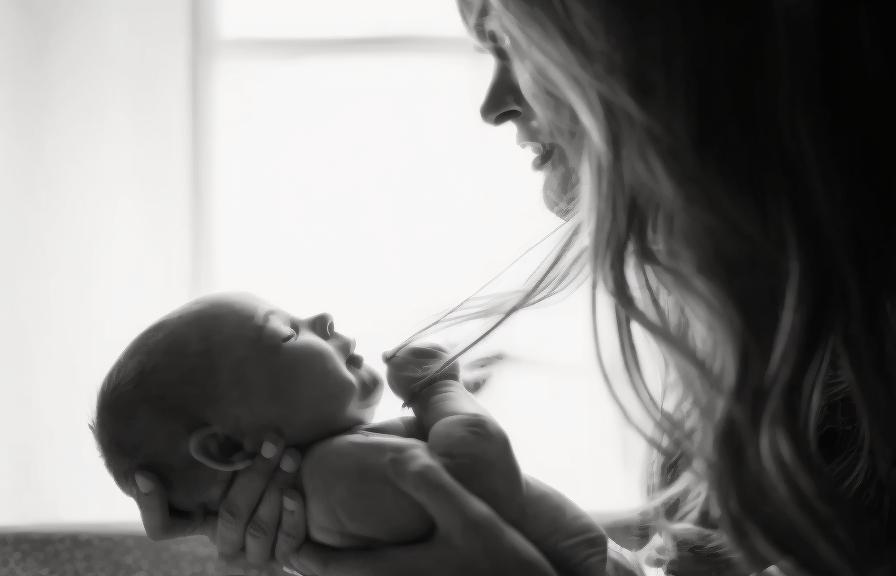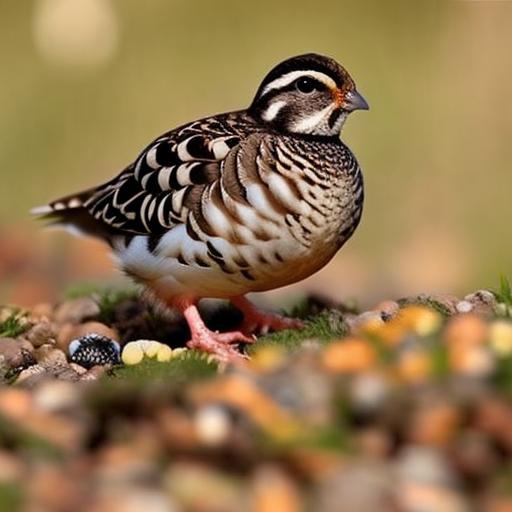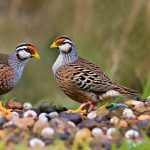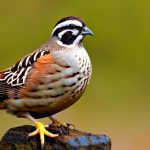Baby quails, also known as chicks, have specific needs that must be met in order for them to thrive and grow into healthy adult quails. Understanding these needs is crucial for anyone looking to raise baby quails. Firstly, baby quails require a warm and safe environment to grow in. They are delicate creatures that need to be protected from harsh weather conditions and predators. Additionally, baby quails need a balanced diet that provides them with the necessary nutrients for healthy growth. Lastly, baby quails need to be handled and socialized with in order to become comfortable around humans and other quails.
Furthermore, baby quails have specific behavioral and developmental needs that must be taken into consideration. They are social animals that thrive in the company of other quails, so it is important to provide them with the opportunity to interact with their peers. Additionally, baby quails have specific nutritional requirements that must be met in order for them to grow into healthy adult quails. It is important to understand these needs in order to provide the best care for baby quails and ensure their well-being and development.
Key Takeaways
- Baby quails need a warm and draft-free environment to thrive
- Providing a balanced diet with high protein is crucial for the growth of baby quails
- Regular health checks and monitoring for signs of illness are important for baby quail care
- Gentle handling and socialization from an early age can help baby quails become more tame and friendly
- Protecting baby quails from predators is essential for their safety and well-being
Creating the Ideal Environment for Baby Quails
Creating the ideal environment for baby quails is essential for their health and well-being. Firstly, it is important to provide a warm and safe space for baby quails to grow in. This can be achieved by using a brooder, which is a heated enclosure that provides a controlled environment for the chicks. The brooder should be equipped with a heat lamp to maintain the appropriate temperature for the baby quails. Additionally, the brooder should be lined with soft bedding material to provide a comfortable and safe space for the chicks.
Furthermore, it is important to provide adequate space for the baby quails to move around and exercise. This can be achieved by providing a spacious brooder or by allowing the chicks access to a larger area as they grow. It is also important to ensure that the environment is free from drafts and other potential hazards that could harm the baby quails. Lastly, it is important to provide the baby quails with access to fresh air and natural light, as this is essential for their overall health and well-being.
Providing the Right Nutrition for Baby Quails
Providing the right nutrition for baby quails is crucial for their growth and development. Baby quails require a balanced diet that provides them with the necessary nutrients for healthy growth. This can be achieved by feeding them a high-quality chick starter feed that is specifically formulated for young quails. The feed should contain a balanced mix of protein, vitamins, and minerals to support the chicks’ growth and development.
Additionally, it is important to provide the baby quails with access to clean water at all times. Water is essential for their overall health and well-being, and it is important to ensure that they have access to fresh water that is free from contaminants. It is also important to monitor the baby quails’ food and water intake to ensure that they are eating and drinking enough to support their growth.
Furthermore, it is important to avoid feeding the baby quails any foods that are harmful to their health. This includes foods that are high in salt, sugar, or fat, as well as any foods that are toxic to birds. It is important to research and understand the specific dietary needs of baby quails in order to provide them with the best nutrition possible.
Monitoring the Health of Baby Quails
Monitoring the health of baby quails is essential for ensuring their well-being and development. It is important to observe the baby quails regularly to look for any signs of illness or distress. This can include monitoring their behavior, appetite, and overall appearance for any changes that could indicate a health issue.
Additionally, it is important to provide the baby quails with regular veterinary care to ensure that they are healthy and free from any potential health issues. This can include regular check-ups and vaccinations to protect the baby quails from common diseases and illnesses.
Furthermore, it is important to keep the baby quails’ environment clean and free from potential hazards that could harm their health. This includes regularly cleaning their living space, providing them with fresh bedding, and ensuring that they have access to clean water at all times.
Handling and Socializing with Baby Quails
Handling and socializing with baby quails is important for their overall well-being and development. It is important to handle the baby quails gently and regularly in order to help them become comfortable around humans. This can include picking them up, holding them, and interacting with them in a calm and gentle manner.
Additionally, it is important to provide the baby quails with opportunities to socialize with other quails. This can include introducing them to other chicks of a similar age or integrating them into a larger flock as they grow. Socializing with other quails helps the baby quails develop important social skills and allows them to form bonds with their peers.
Furthermore, it is important to provide the baby quails with mental stimulation in order to keep them engaged and happy. This can include providing them with toys, perches, and other enrichment activities that encourage natural behaviors such as pecking, scratching, and exploring.
Protecting Baby Quails from Predators

Protecting baby quails from predators is essential for their safety and well-being. Baby quails are vulnerable to a wide range of predators, including birds of prey, snakes, and small mammals. It is important to take steps to protect the baby quails from potential threats in order to ensure their safety.
One way to protect baby quails from predators is by providing them with a secure living space that is equipped with predator-proof fencing or netting. This can help prevent predators from gaining access to the baby quails’ living area and keep them safe from harm.
Additionally, it is important to be vigilant and observant of any potential threats in the surrounding area. This can include keeping an eye out for any signs of predators such as tracks or droppings, as well as taking steps to deter potential threats from approaching the baby quails’ living space.
Furthermore, it is important to provide the baby quails with shelter and hiding spots where they can seek refuge from potential predators. This can include providing them with dense vegetation or structures such as shelters or hiding boxes where they can escape from danger.
Transitioning Baby Quails to Adult Quail Care
As baby quails grow into adult quails, it is important to transition them to adult quail care in order to support their changing needs. This can include providing them with a larger living space that allows them more room to move around and exercise. Additionally, it is important to transition them onto an adult quail feed that provides them with the necessary nutrients for their continued growth and development.
Furthermore, it is important to provide the adult quails with opportunities for breeding if desired. This can include providing them with nesting boxes or areas where they can lay eggs and raise their young. It is also important to monitor the adult quails’ health and well-being as they transition into adulthood in order to ensure that they are thriving and healthy.
In conclusion, understanding the needs of baby quails is essential for anyone looking to raise these delicate creatures. By creating the ideal environment, providing the right nutrition, monitoring their health, handling and socializing with them, protecting them from predators, and transitioning them into adulthood, you can ensure that your baby quails grow into healthy adult quails. With proper care and attention, raising baby quails can be a rewarding experience that allows you to witness these fascinating birds thrive and flourish.
If you’re interested in learning more about raising baby quails, you might also want to check out this insightful article on how long it takes for chicken eggs to hatch naturally. Understanding the incubation process can provide valuable insights into caring for young quails and ensuring their survival.
FAQs
What do baby quails eat?
Baby quails should be fed a diet of high-protein game bird starter feed, which can be found at most pet stores or farm supply stores. Additionally, they can be given small insects, such as mealworms, as treats.
How often should baby quails be fed?
Baby quails should be fed small amounts of food several times a day. As they grow, the frequency of feeding can be reduced to 2-3 times a day.
How should baby quails be housed?
Baby quails should be kept in a brooder with a heat lamp to maintain a temperature of around 95 degrees Fahrenheit for the first week, then gradually reduced by 5 degrees each week until they are fully feathered. The brooder should be lined with paper towels or pine shavings and provide enough space for the quails to move around.
What are common health issues for baby quails?
Common health issues for baby quails include pasty butt, which is a condition where droppings stick to the vent and can block it, and splayed legs, which is a condition where the legs are unable to support the bird’s weight. It’s important to monitor the quails for these issues and take appropriate measures to address them.
How can I ensure the safety of baby quails?
To ensure the safety of baby quails, it’s important to keep them in a secure brooder to protect them from predators and provide them with clean water and food. Additionally, monitoring their health and addressing any issues promptly is crucial for their well-being.
Meet Walter, the feathered-friend fanatic of Florida! Nestled in the sunshine state, Walter struts through life with his feathered companions, clucking his way to happiness. With a coop that’s fancier than a five-star hotel, he’s the Don Juan of the chicken world. When he’s not teaching his hens to do the cha-cha, you’ll find him in a heated debate with his prized rooster, Sir Clucks-a-Lot. Walter’s poultry passion is no yolk; he’s the sunny-side-up guy you never knew you needed in your flock of friends!







